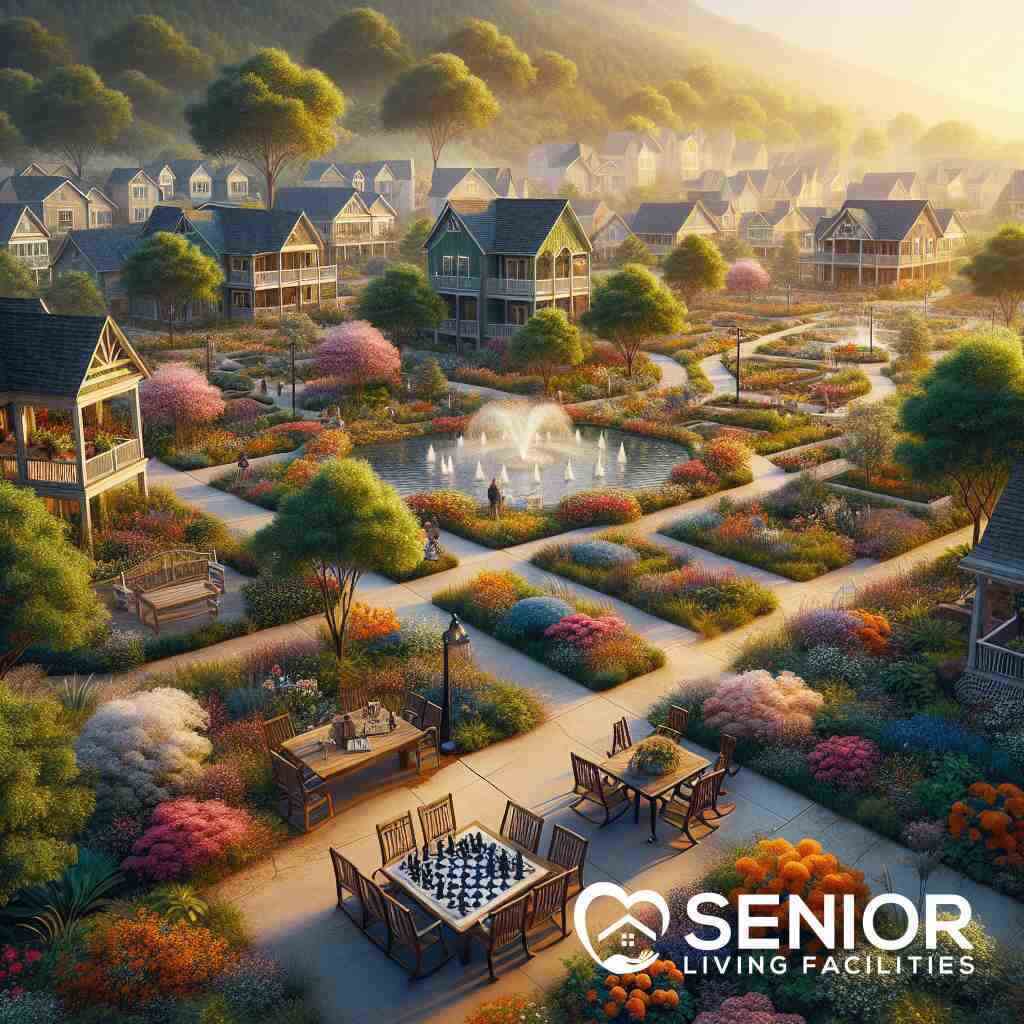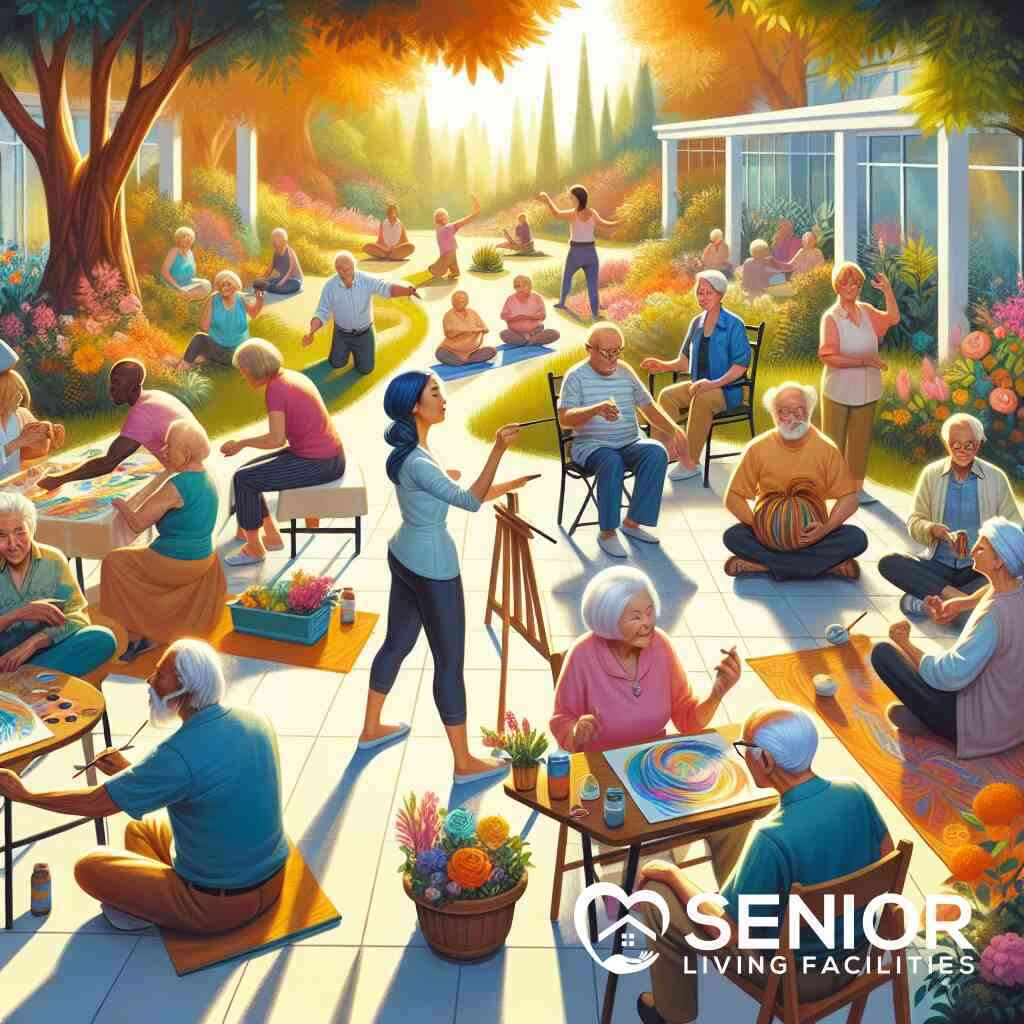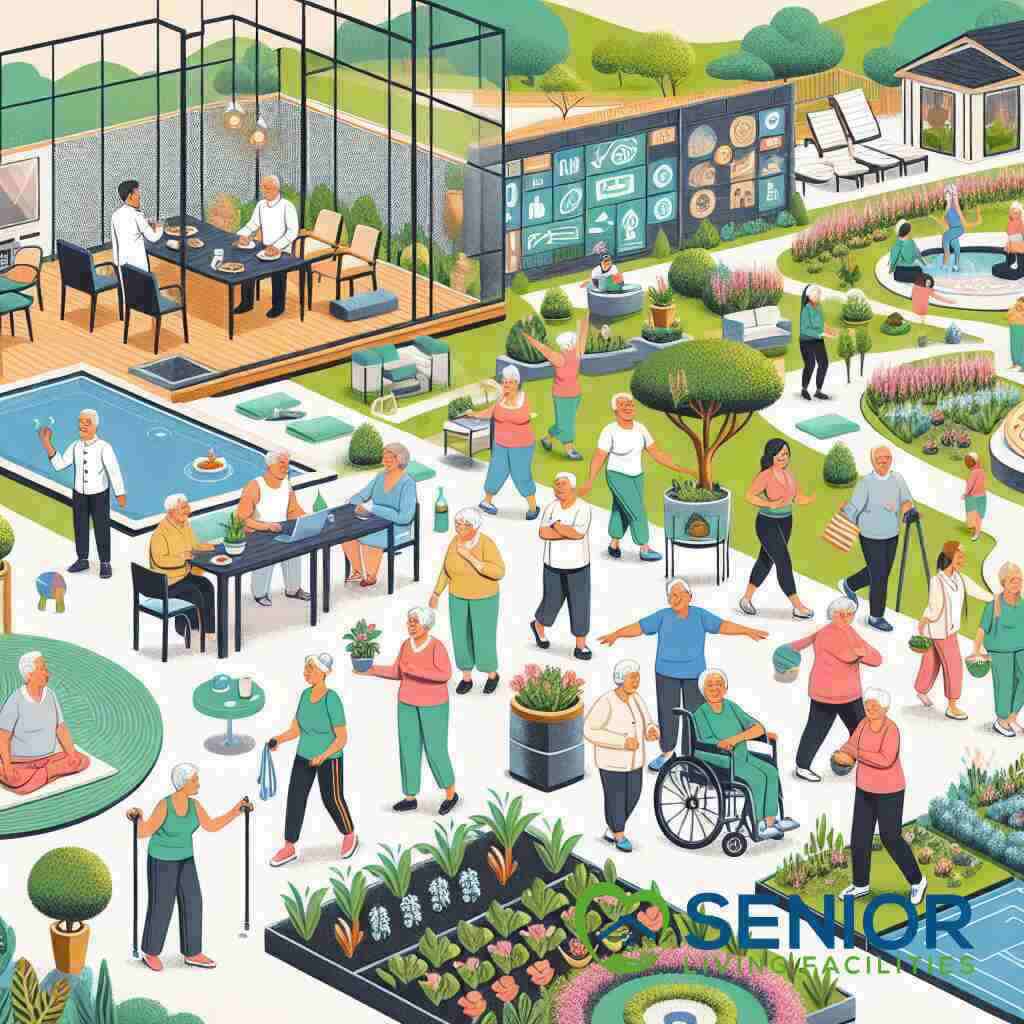
What Defines Assisted Living in North Carolina?
September 16, 2024
Introduction to Assisted Living in North Carolina
Understanding Assisted Living
Assisted living in North Carolina represents a crucial segment of senior care, designed to fill the gap between independent living and the more intensive care provided in nursing homes. At its core, assisted living offers a balance of autonomy and assistance, empowering residents to lead fulfilling lives while receiving the support they need. This unique care setting caters to individuals who require help with daily activities like bathing, dressing, and medication management yet wish to maintain as much independence as possible. Facilities across North Carolina are meticulously designed to foster a sense of community, ensuring that every resident feels at home.
The Importance of Quality Care in North Carolina Senior Living
Quality care in North Carolina for seniors is not just a priority- it’s a mandate. The state’s focus on high-quality assisted living services stems from a deep understanding of the unique needs of its aging population. Quality care encompasses not only the physical assistance provided but also the emotional and psychological support that elevates the overall well-being of seniors. In North Carolina, senior living facilities are equipped with skilled professionals who are not only caregivers but also compassionate companions committed to enhancing the daily lives of residents through personalized care plans and meaningful interactions.
Overview of Assisted Living Regulations in North Carolina
Navigating the regulatory landscape of assisted living in North Carolina is essential for families seeking the best care options. The state mandates that all assisted living facilities adhere to stringent regulations, ensuring the safety, well-being, and dignity of residents. These regulations cover a wide range of operational aspects, from the minimum staffing levels required to the types of services that must be offered. An understanding of these rules is crucial for anyone looking to find a suitable senior living facility, as compliance with these standards is a strong indicator of the quality of care provided.
Key Components of Assisted Living in North Carolina
Personal Care Services in North Carolina
In North Carolina, assisted living facilities are dedicated to providing residents with comprehensive personal care services, which are foundational to their mission. These services cover a broad spectrum of needs, highlighting assistance with activities of daily living (ADLs). Facilities ensure that residents receive help with personal hygiene, including bathing, grooming, and dressing. Eating aid is also provided, ensuring that nutritional needs are met with dignity and respect. Mobility aids range from help with walking to transfer assistance, ensuring that every resident can navigate their space safely. To ensure the highest quality of personal care, many facilities collaborate with licensed home health agencies under the rigorous oversight of the Department of Health and Human Services. This collaboration ensures that residents have access to skilled care within the comfort and familiarity of their assisted living community.
Daily Living Support in North Carolina
Assisted living in North Carolina goes beyond basic care needs, emphasizing daily living support that enhances residents’ quality of life. This includes not just personal care but also assistance with housekeeping, laundry, and medication management. Such support ensures a safe living environment, minimizing the risks associated with medication errors and maintaining a clean and hygienic space. Nutrition is a critical component, with facilities providing at least one meal a day – often, this includes multiple meal options customized to dietary needs and preferences. Through these services, residents maintain as much independence as possible, with the added assurance of support whenever it’s needed.
Medical and Health Services Overview
The healthcare services offered in North Carolina’s assisted living facilities are designed to address the varying medical needs of seniors. While assisted living communities do not provide the same level of medical care as nursing homes, they do ensure access to routine medical services. This often includes coordinating care with external healthcare providers, monitoring residents’ health, and, in some cases, providing on-site access to medical professionals such as nurses or visiting doctors. Emphasis is also placed on wellness and preventative care, aiming to keep residents healthy and reduce the need for hospitalization. This holistic approach to healthcare in assisted living facilities underlines the importance of tailored, resident-centered medical services grounded in understanding and compassion.
Social and Recreational Activities
Social engagement and recreational activities are pivotal in North Carolina’s assisted living facilities, contributing significantly to the mental and emotional well-being of residents. These communities offer a vibrant calendar of events, ranging from educational classes and exercise programs to social gatherings and cultural outings. Such activities not only foster a sense of community and belonging among residents but also support physical health and cognitive function. With input from residents, activities are designed to match interests and capabilities, ensuring everyone has the opportunity to engage in meaningful and enjoyable pursuits. This holistic focus on the well-being of residents highlights the essence of assisted living in North Carolina: to provide a nurturing environment that supports both the body and the spirit.
Choosing the Right Assisted Living Facility
How to Use Assisted Living Locator North Carolina
Finding the right assisted living facility in North Carolina can initially seem daunting. However, with tools like the Assisted Living Locator provided by Senior Living Facilities, the process becomes significantly easier and more efficient. This powerful online tool offers a streamlined approach to searching for assisted living in North Carolina, allowing users to filter options based on location, care needs, and budget. To begin, enter your desired city or zip code in North Carolina. The locator then presents a list of senior living facilities that match your criteria. Each listing provides detailed information about the community, including services offered, amenities, and pricing. This readily accessible information ensures that families and seniors can make informed decisions right from the start. Additionally, Senior Living Facilities offers expert guidance and personalized support, streamlining the search process even further.
Comparing Assisted Living Plans in North Carolina
The diversity of assisted living plans in North Carolina underscores the importance of careful comparison. When examining various assisted living options, consider not only the cost but also the breadth and depth of services offered. Key aspects to evaluate include the level of personal care services, the range of daily living support activities, medical and health services oversight, and the quality and variety of social and recreational activities. For comprehensive insight into the available options, the guide What is Assisted Living? A Clear Guide for Families near North Carolina serves as an essential resource. It offers clarity on the subtleties distinguishing one plan from another, aiding families in finding a facility that aligns with their specific needs and preferences. Detailed comparisons ensure that the selected facility can provide a vibrant, supportive, and adequately resourced environment for seniors.
What to Look for in a Senior Living Community
Choosing a senior living community in North Carolina goes beyond comparing costs and services. A facility that stands out often has a palpable sense of community and belonging, where residents feel valued and engaged. Look for communities that prioritize personalized care plans tailored to meet the unique needs and preferences of each resident. Effective daily living support mechanisms, including assistance with personal care, housekeeping, and medication management, are fundamental. However, it’s the extra touches that make a difference, such as diverse social activities, access to nature, pet-friendly policies, and the availability of spiritual or religious services. Facilities that embrace a holistic approach to senior care, focusing equally on physical, emotional, and social well-being, often provide the most fulfilling living experiences.
In evaluating these communities, consider the best wellness programs in senior communities in North Carolina, ensuring a match between a community’s offerings and the resident’s interests and wellness goals. Transparent communication and the community’s willingness to evolve based on resident feedback are also critical markers of a quality senior living environment. Ultimately, the right community is one where seniors can thrive, not just live, supported by compassionate care and a rich tapestry of life-enhancing activities.
Legal and Safety Standards for Assisted Living in North Carolina
Regulations and Licensing
In North Carolina, the landscape of assisted living regulations and licensing is designed to uphold the highest standards of care and safety for seniors. These regulations are enforced by the state’s Department of Health and Human Services, which implements rigorous licensing requirements. Every assisted living community must comply with these state-mandated standards, which cover everything from facility construction to staff qualifications and resident care policies. The licensing process involves regular inspections and audits to ensure facilities adhere to operational, health, and safety standards. Assisted Living regulations in North Carolina serve as a foundational pillar, ensuring that every senior living community provides a safe, nurturing, and legally compliant environment.
Safety Standards and Protocols
The emphasis on safety standards and protocols in North Carolina’s assisted living facilities is paramount. These standards are meticulously crafted to mitigate risks and ensure a secure living environment for all residents. Protocols cover a range of safety measures, including emergency preparedness plans, fire safety, medication management, and the prevention of falls. Staff at these facilities undergo specialized training to handle emergencies and provide first aid, ensuring a prompt response to any situation. Additionally, facilities are equipped with security features such as surveillance systems and secure entry points to protect residents from external threats. By upholding these rigorous safety standards, assisted living communities in North Carolina offer peace of mind to families and a secure home for seniors.
Residents’ Rights and Protections
In North Carolina, the rights and protections of assisted living residents are enshrined in both state law and facility policies. These rights ensure that residents are treated with dignity, respect, and fairness, fostering an environment of trust and community. Residents have the right to privacy, autonomy in their daily lives, and freedom from abuse, neglect, and exploitation. They are also entitled to be informed about their care plans, participate in decisions affecting their care, and voice grievances without fear of reprisal. Facilities are required to have clear policies and procedures in place to protect these rights and to address any concerns or complaints swiftly. The commitment to upholding the rights and protections of seniors underscores the core values of compassionate senior care in North Carolina, ensuring that every resident is treated with the utmost respect and care.
The Difference Between Assisted Living and Other Senior Living Options
Assisted Living vs. Independent Living Communities
Assisted living and independent living communities both serve as popular senior housing options, yet they cater to distinct resident needs and preferences. Independent living communities are designed for seniors who are largely self-sufficient but seek the convenience of community living, often providing amenities such as housekeeping, maintenance, and social activities. Assisted living, on the other hand, offers a deeper level of care, assisting residents with activities of daily living (ADLs) such as bathing, dressing, and medication management. This option is tailored for those who value their independence but require more hands-on support than what is available in independent living. The choice between these two living arrangements hinges on the individual’s health status, level of independence, and personal preferences, with assisted living providing a structured environment aimed at those in need of regular assistance.
Nursing Homes for the Elderly and How They Differ
Nursing homes, or skilled nursing facilities, offer a higher level of medical care than assisted living facilities, catering to individuals with serious health conditions requiring 24/7 care and supervision. These facilities are equipped with medical professionals, including nurses and therapists, who can provide residents with comprehensive medical attention and rehabilitation services. While assisted living facilities focus on helping residents with daily activities and may offer some level of medical care, they do not provide the extensive medical and nursing oversight found in nursing homes. The decision to choose a nursing home over assisted living typically arises from a necessity for ongoing, intensive medical care-something beyond the scope of assisted living services. Understanding the pivotal differences between these options enables families to better align their choices with the specific health and personal needs of their loved ones.
In-Home Senior Care and Its Place in Senior Care Options
In-home senior care represents a viable alternative to both assisted living and nursing homes, offering the advantage of familiar surroundings coupled with customizable levels of care. This option allows seniors to remain in their homes while receiving services such as personal care, meal preparation, and medical treatment through visiting caregivers or healthcare professionals. A pivotal benefit of in-home care is its adaptability; care plans can be tailored to meet the changing needs of seniors, ranging from occasional assistance with household tasks to full-time, skilled medical care. This level of flexibility makes in-home senior care a preferred choice for seniors who require support but are not ready to transition to a more structured living environment like those found in assisted living or nursing homes. Deciding on in-home care involves evaluating the senior’s health requirements, their desire to remain at home, and the feasibility of adapting the home environment to meet their care needs safely and effectively.
Financial Considerations for Assisted Living in North Carolina
Understanding Costs
The financial aspect of transitioning to assisted living in North Carolina is a significant concern for many families. The cost of assisted living can vary widely depending on location, facility amenities, and the level of care required. Generally, rates are determined by the extent of services a resident needs, with basic costs covering room, board, and routine personal care services. Additional fees may apply for specialized care, medical services, and extra amenities. It’s crucial for families to thoroughly investigate what is included in the monthly payment and what might lead to additional charges. By understanding these costs upfront, families can make informed decisions that align with their financial capabilities and care needs.
Exploring Payment Options and Assistance
Navigating payment options and financial assistance for assisted living in North Carolina is a vital step for many families. Various payment options exist, including private pay through savings, pension, and retirement funds, as well as long-term care insurance policies that may cover a portion of the costs. Veterans’ benefits can also be a valuable resource for eligible individuals, offering financial assistance for those who have served. Additionally, while Medicare typically does not cover the costs of assisted living, Medicaid may provide some support to eligible residents, particularly through waiver programs designed to cover personal care services. Families should explore all available options, from resources for seniors living in North Carolina to federal and state programs, to identify potential financial solutions.
Budgeting for Long-Term Care
Effective budgeting for long-term care in assisted living facilities in North Carolina requires foresight and realistic planning. Families should approach this with an understanding of potential cost increases over time as healthcare needs evolve. A comprehensive budget should account for the initial costs of moving into an assisted living facility, ongoing monthly fees, and the possibility of additional services needed in the future. It’s advisable to include a cushion for unforeseen expenses to ensure financial stability. Consulting with financial planners who specialize in senior care can provide valuable insights into managing assets and income streams to fund long-term care. Planning with a detailed budget offers peace of mind and a secure foundation as seniors transition into this new chapter of their lives.
Conclusion: Navigating Your Assisted Living Choices in North Carolina
Making an Informed Decision
Selecting the right assisted living facility in North Carolina involves a blend of research, understanding personal needs, and considering future requirements. The journey toward finding a senior living community should start with a comprehensive evaluation of what matters most to you or your loved one in terms of care, lifestyle, and personal preferences. By leveraging assisted living versus nursing homes in North Carolina, families can make a distinction on what type of care is most suitable. It is pivotal to weigh the options by considering the level of assistance needed with activities of daily living, the desired social environment, and the medical services offered. Making an informed decision is not just about matching needs with services; it’s about ensuring a quality of life that everyone deserves in their senior years.
Connecting with Senior Living Communities
Once you have identified potential assisted living facilities in North Carolina, the next step is to connect with them to gather more detailed information. Senior Living Facilities offer a direct line to a wide range of senior living options, from vibrant communities designed for those 55 and older to specialized care facilities. Utilize the platform to inquire directly about the specifics like care plans, activities, meal options, and community culture. Personal visits, either virtual or in-person, can provide invaluable insights into the daily operations and the atmosphere of the facility. Interacting with staff and residents gives a clearer picture of what to expect. It can significantly aid in making a more confident choice among the available seniors living near you in North Carolina.
Ensuring a Smooth Transition into Assisted Living
Transitioning into an assisted living community is a significant life change not only for seniors but also for their families. It’s crucial to approach this transition with sensitivity and preparation. Start by discussing openly the move, focusing on the positive aspects and the benefits of assisted living. Engaging in this new chapter with an optimistic outlook can greatly alleviate any anxiety or uncertainty. Preparing for the move involves not just packing but also familiarizing oneself with the new routines and the community rules. Encourage involvement in social activities and the vibrant life that assisted living offers to foster a sense of belonging and ease the adaptation process. Remember, moving to a senior living community is not an ending but rather a continuation of a rich, fulfilling life.
Choosing an assisted living facility in North Carolina is about finding a place that reflects the values and needs of the individual, ensuring they receive the support required while maintaining their independence and dignity. Through careful research, connecting with communities, and preparing for the transition, families can navigate the array of options to find the perfect senior living solution, ensuring a smooth and respectful transition into assisted living.
Frequently Asked Questions
Question: How can senior living facilities help find the right assisted living facility in North Carolina?
Answer: Senior Living Facilities empowers families and individuals by providing an extensive, user-friendly Assisted Living Locator North Carolina tool on our platform. This powerful tool simplifies the search for North Carolina assisted living facilities by allowing users to filter options based on specific needs like location, care requirements, and budget. Our extensive database covers a wide range of senior living options across all 50 states, including a variety of communities for seniors 55+ in North Carolina. With Senior Living Facilities, you receive personalized support and expert guidance to help you compare and connect with the ideal senior living community. We’re committed to ensuring you find a facility that promises quality care in North Carolina senior living, matching both your and your loved one’s preferences and needs.
Question: What sets apart assisted living plans in North Carolina found through Senior Living Facilities from other options?
Answer: Assisted living plans in North Carolina found through Senior Living Facilities stand out due to our platform’s dedication to offering a carefully curated selection of facilities that are meticulously vetted for the highest standards of quality care in North Carolina senior living. Our listings include detailed information about each community, encompassing services offered, staff qualifications, availability of medical care, personalized care plans, and even social activities for seniors. We ensure these communities not only provide daily living support in North Carolina but also foster a nurturing environment for seniors to lead a fulfilling life. Our emphasis on personalized care, aligned with the unique needs of each resident, ensures families make an informed decision that best supports their loved one’s independence and well-being.
Question: In what ways do the assisted living locations in North Carolina featured on your website cater to the medical needs of seniors?
Answer: The assisted living locations in North Carolina featured on Senior Living Facilities are selected for their comprehensive approach to senior medical care. Recognizing that healthcare needs vary widely among seniors, these facilities offer access to routine medical services, coordination with external healthcare providers, and, in some cases, on-site access to medical professionals such as nurses or visiting doctors. Tailored to fill the gap between independent living and the more intensive care nursing homes offer, our featured facilities place a strong emphasis on wellness and preventative care. This holistic healthcare approach aims to maintain residents’ health, encourage independence, and minimize the need for hospitalization, ensuring a higher quality of life for seniors within our communities.
Question: Can Senior Living Facilities help locate senior apartment rentals in North Carolina for those looking for less intensive care options?
Answer: Absolutely; senior living facilities are not limited to just assisted living solutions; they also offer a vast selection of senior apartment rentals in North Carolina for those seeking less intensive care options. Our platform caters to various senior housing preferences, including independent living communities that are perfect for seniors who are mostly self-sufficient but appreciate the convenience of on-site amenities and a community environment. We understand the importance of finding a living situation that perfectly matches your lifestyle and level of independence, which is why our Assisted Living Locator tool can be customized to find housing options that meet your specific criteria, whether you’re searching for communities for seniors 55+ in North Carolina or specialized senior care services.
Question: How does the blog post “What Defines Assisted Living in North Carolina?” help families in making informed decisions?
Answer: The blog post “What Defines Assisted Living in North Carolina?” serves as a comprehensive resource that delves into the essentials of assisted living within the state, illuminating the unique balance of autonomy and assistance these communities provide. By outlining the importance of quality care, detailing the regulatory landscape, and explaining the transition process, the post aids families in understanding what to expect from seniors living in North Carolina. Additionally, it highlights Senior Living Facilities’ commitment to assisting families in navigating these decisions by offering insight into the variety of services, levels of care, and lifestyle benefits available. We aim to present a clear picture of the possibilities, ensuring families are well-informed and confident in selecting a community that aligns with their loved one’s preferences and needs, fostering a smooth and respectful transition into senior living.




